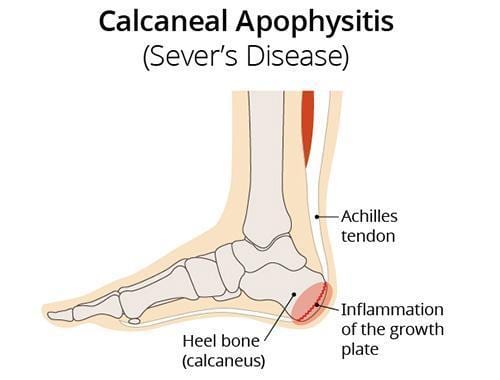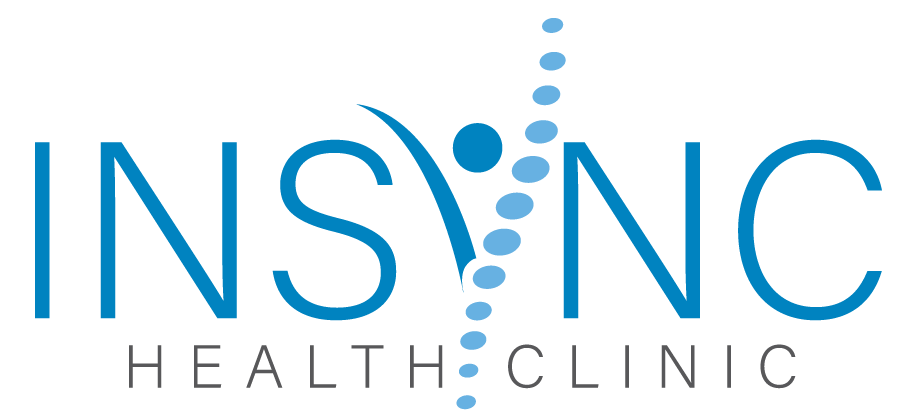Does your child complain about pain in the back of their heel?
Is your child’s performance being restricted by ‘Achilles’ pain?
Sever’s disease is a common condition that arises in adolescents, particularly those who are active. There are two common perspectives towards Sever’s:
- Some regard it as growing pains and therefore view treatment as mild and short – term.
- Another perspective is that because Sever’s is known as a ‘disease’, children will overcommit to treatment and lose confidence in their normal day – to – day activities during and after treatment for Sever’s.

The most important aspect to understand about Sever’s is that even though it is named as a ‘disease’, it is not a severe condition as it’s connotation may suggest.
On the back of your heel bone, known as your Calcaneus, lies a growth plate that’s responsible for developing the connection between your Calf Muscles, Achilles Tendon and Plantar Fascia. For adolescents, this growth plate does not fully develop until roughly the age of 14 (differs between male and female as well as to the individual level). Therefore, at this age and prior, the growth plate is exposed to injuries and inflamation for various reasons.
As the Calf, Achilles and Plantar Fascia complex are exposed to large forces during sporting activities such as running and jumping – adolescents who are active are at a greater risk of developing Sever’s. Furthermore, adolescents who are overweight or have abnormal foot mechanics are also at risk of developing Sever’s.
The common fix would be to tell your child to slow down, or to stop playing… however……good luck with that!!
Therefore, it is important to get your child a thorough assessment to correctly identify the impairments and then to target those causes of Sever’s to ensure that it is settled effectively and that another flare – up is less likely to occur once it has settled.
If by chance a flare – up of Sever’s occurs, you may be wondering what the best home treatments are in order to settle it in the short – term prior to assessment. Here are a few common treatments that you can try at home:
- Heat: apply a warm wheat bag to your child’s foot where it is sore for approximately 15 minutes. Ensure the wheat bag is not hot.
- Rest: have your child’s foot elevated and ensure they are walking minimally to not exaggerate further pull on the Achilles. Until it has settled, rest from sporting activities is advised.
- Massage: a gentle massage of your child’s Calf muscles will take pressure off their Achilles, and also provide them with a great feeling to get their mind off their pain.
- Avoid walking barefoot: wearing supportive shoes is advised as barefoot activities may exaggerate a pull on the Achilles and cause pain during a flare – up.
- Heel Lift: placing a lift under the heel can take pressure off the growth plate by shortening the calf muscle. This will only help in the short term.
It is important to see your Physiotherapist as soon as a flare – up of Sever’s arises for further treatment and to begin a rehabilitation program. If your child is having Sever’s – related symptoms or other foot – related issues, contact the team at INSYNC PHYSIOTHERAPY and SOLE – LUTION PODIATRY for assistance.
You can contact our practice on 02 9569 5145 or book an appointment online. In the meantime,watch the video below and learn how to tape yourself as a par of effectively managing your injury.
Thanks for reading,
Insync Physiotherapy Team
If you have Osgood Schlatters and require physiotherapy treatment, be sure to secure an appointment with one of our team members at Insync Physiotherapy in Marrickville for effective relief and prevention of symptoms. You can contact our practice on (02) 7226 3432 or book an appointment online. In the meantime,watch the video below and learn how to tape yourself as a par of effectively managing your injury.
Thanks for reading,
Insync Physiotherapy Team
